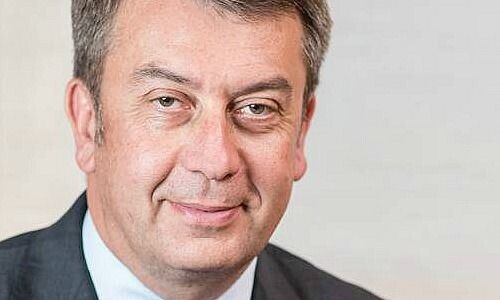Stéphane Monier: «Any Conflict Requires Cash»
The invasion of Ukraine will drive Russia into recession, undermining its prospects in the short and long term, Stéphane Monier writes in an essay on finews.first.
This article is published on finews.first, a forum for authors specialized in economic and financial topics.
War in Ukraine is changing the geopolitical and economic landscape, with profound consequences for global growth and markets. Twenty-three years after taking power in the Kremlin, President Vladimir Putin looks ready to cripple Russia’s economy for geopolitical gain. Within days, the EU has overturned decades of defense and energy policies to respond with unprecedented sanctions. The invasion will drive Russia into recession, undermining its prospects in the short and long term.
After weeks of denials of Western intelligence reports, President Putin has started the biggest conventional war in Europe since 1945, threatened to deploy nuclear weapons, and used Belarus as a base from which to launch the northern arm of the invasion of Ukraine. The Russian president has described the invasion as a «special military operation» to «demilitarise» Ukraine. Ukraine’s forces continue to fight back, mobilizing reservists to resist and slow the invasion.
«The EU, U.S. and allies have increased sanctions over the past week, gradually isolating Russia’s leadership»
Ukraine gained independence following the collapse of the Soviet Union thirty years ago. With the world’s attention on fighting the Covid pandemic, Putin began massing Russian forces on Ukraine’s borders in spring 2021, arguing that Ukraine is inseparable from Russia with a common identity and history, objecting to Ukraine’s focus on closer ties with the European Union and ties with the North Atlantic Treaty Organisation (NATO).
The EU, U.S. and allies have steadily increased sanctions over the past week, gradually isolating Russia’s leadership and institutions. Before the invasion on 24 February 2022, the EU began imposing sanctions on Russian individuals and Germany called a halt to its approval process of the Nord Stream 2 pipeline through the Baltic Sea.
«Russian oil and gas continue to flow, as they did throughout the Cold War»
Since the attack, the EU and U.S. have frozen the assets of more individuals and outlawed trading in sovereign debt issued by the central bank. The EU has also frozen the assets of Putin, Russian Foreign Minister Sergey Lavrov and all members of Russia’s Duma, its security council, as well as Belarusian officials linked to the war. Furthermore, the 26-nation EU has banned all Russian aircraft from its airspace.
In addition, the West has now blocked access of a number of Russian banks to the SWIFT messaging system that financial institutions use to make trades, confirm payments, exchange currencies and transfer orders. This will mean that oil and gas payments from Western firms to Russian suppliers remain possible, although routed through a more limited number of channels. For now, the energy sector has not been implicated in sanctions, and Russian oil and gas continue to flow, as they did throughout the Cold War.
«Russia’s central bank has pursued a de-dollarization policy since at least 2018»
Any conflict requires cash. Western countries have now frozen the Russian central bank’s access to foreign reserves, undermining Russia’s ability to finance the war as well as support its own economy and purchase roubles to prop up its currency. Since annexing Crimea in 2014, Putin doubled Russia’s reserves, worth $630 billion in foreign currency before last week’s invasion. These reserves exist as assets held by foreign central banks, including the European Central Bank and U.S. Federal Reserve.
Since 2014, Russia and China have wound down their dependence on the dollar in international trade to an estimated 40 percent of transactions, switching instead to the euro. Russia’s central bank has pursued a de-dollarization policy since at least 2018. In June 2021, Russia announced that its National Wealth Fund, which manages over $170 billion, would sell all its dollar-denominated investments, leaving 40 percent of its assets in euros, 30 percent Chinese renminbi and 20 percent in gold. The freezing of access to foreign reserves puts Russia on a blacklist with only three other countries: Iran, Venezuela and North Korea.
Stéphane Monier is the Chief Investment Officer (CIO) at Lombard Odier Private Bank.
Previous contributions: Rudi Bogni, Peter Kurer, Rolf Banz, Dieter Ruloff, Werner Vogt, Walter Wittmann, Alfred Mettler, Robert Holzach, Craig Murray, David Zollinger, Arthur Bolliger, Beat Kappeler, Chris Rowe, Stefan Gerlach, Marc Lussy, Nuno Fernandes, Richard Egger, Maurice Pedergnana, Marco Bargel, Steve Hanke, Urs Schoettli, Ursula Finsterwald, Stefan Kreuzkamp, Oliver Bussmann, Michael Benz, Albert Steck, Martin Dahinden, Thomas Fedier, Alfred Mettler, Brigitte Strebel, Mirjam Staub-Bisang, Nicolas Roth, Thorsten Polleit, Kim Iskyan, Stephen Dover, Denise Kenyon-Rouvinez, Christian Dreyer, Kinan Khadam-Al-Jame, Robert Hemmi, Anton Affentranger, Yves Mirabaud, Katharina Bart, Frédéric Papp, Hans-Martin Kraus, Gerard Guerdat, Mario Bassi, Stephen Thariyan, Dan Steinbock, Rino Borini, Bert Flossbach, Michael Hasenstab, Guido Schilling, Werner E. Rutsch, Dorte Bech Vizard, Adriano B. Lucatelli, Katharina Bart, Maya Bhandari, Jean Tirole, Hans Jakob Roth, Marco Martinelli, Thomas Sutter, Tom King, Werner Peyer, Thomas Kupfer, Peter Kurer, Arturo Bris, Frederic Papp, James Syme, Dennis Larsen, Bernd Kramer, Armin Jans, Nicolas Roth, Hans Ulrich Jost, Patrick Hunger, Fabrizio Quirighetti, Claire Shaw, Peter Fanconi, Alex Wolf, Dan Steinbock, Patrick Scheurle, Sandro Occhilupo, Will Ballard, Nicholas Yeo, Claude-Alain Margelisch, Jean-François Hirschel, Jens Pongratz, Samuel Gerber, Philipp Weckherlin, Anne Richards, Antoni Trenchev, Benoit Barbereau, Pascal R. Bersier, Shaul Lifshitz, Klaus Breiner, Ana Botín, Martin Gilbert, Jesper Koll, Ingo Rauser, Carlo Capaul, Claude Baumann, Markus Winkler, Konrad Hummler, Thomas Steinemann, Christina Boeck, Guillaume Compeyron, Miro Zivkovic, Alexander F. Wagner, Eric Heymann, Christoph Sax, Felix Brem, Jochen Moebert, Jacques-Aurélien Marcireau, Ursula Finsterwald, Claudia Kraaz, Michel Longhini, Stefan Blum, Zsolt Kohalmi, Karin M. Klossek, Nicolas Ramelet, Søren Bjønness, Andreas Britt, Gilles Prince, Salman Ahmed, Stephane Monier, and Peter van der Welle, Ken Orchard, Christian Gast, Jeffrey Bohn, Juergen Braunstein, Jeff Voegeli, Fiona Frick, Stefan Schneider, Matthias Hunn, Andreas Vetsch, Fabiana Fedeli, Marionna Wegenstein, Kim Fournais, Carole Millet, Swetha Ramachandran, Brigitte Kaps, Thomas Stucki, Neil Shearing, Claude Baumann, Tom Naratil, Oliver Berger, Robert Sharps, Tobias Mueller, Florian Wicki, Jean Keller, Niels Lan Doky, Karin M. Klossek, Johnny El Hachem, Judith Basad, Katharina Bart, Thorsten Polleit, Bernardo Brunschwiler, Peter Schmid, Karam Hinduja, Zsolt Kohalmi, Raphaël Surber, Santosh Brivio, Mark Urquhart, Olivier Kessler, Bruno Capone, Peter Hody, Andrew Isbester, Florin Baeriswyl, and Michael Bornhaeusser, Agnieszka Walorska, Thomas Mueller, Ebrahim Attarzadeh, Marcel Hostettler, Hui Zhang, Michael Bornhaeusser, Reto Jauch, Angela Agostini, Guy de Blonay, Tatjana Greil Castro, Jean-Baptiste Berthon, Marc Saint John Webb, Dietrich Goenemeyer, Mobeen Tahir, Didier Saint-Georges, Serge Tabachnik, Rolando Grandi, Vega Ibanez, David Folkerts-Landau, Andreas Ita, Teodoro Cocca, Michael Welti, Mihkel Vitsur, Fabrizio Pagani, Roman Balzan, Todd Saligman, Christian Kaelin, Stuart Dunbar, Carina Schaurte, Birte Orth-Freese, Gun Woo, Lamara von Albertini, Philip Adler, Ramon Vogt, Gérard Piasko, Andrea Hoffmann, Niccolò Garzelli, Darren Williams, Benjamin Böhner, Mike Judith, Gregoire Bordier, Jared Cook, Henk Grootveld, Roman Gaus, Nicolas Faller, Anna Stünzi, Philipp Kaupke, Thomas Höhne-Sparborth, Fabrizio Pagani, Taimur Hyat, Ralph Ebert, Guy de Blonay, Jan Boudewijns, Beat Wittmann, Sean Hagerty, Alina Donets, Sébastien Galy, Lars Jaeger, Roman von Ah, Fernando Fernández, and Georg von Wyss.



























